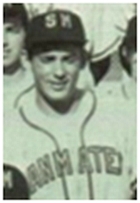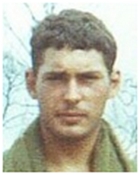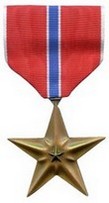This page is sponsored by Mark Haubenstein, founder of findmymedals.com, a website dedicated to helping veterans and their families research, recover or replace war medals. Mark is also a freelance writer and has written for "America in WWII" magazine. He resides in San Jose, CA.
Chuck Chase
| Date and Place of Birth: | November 27, 1946 San Mateo, CA |
| Date and Place of Death: | June 11, 1968 Kontum Province, South Vietnam |
| Baseball Experience: | Minor League |
| Position: | Outfield |
| Rank: | Staff Sergeant |
| Military Unit: | A Company, 1st Battalion, 35th Infantry Regiment, 4th Infantry Division US Army |
| Area Served: | Vietnam |
“If your actions inspire others to dream more, learn more, do
more and become more, you are a leader”.
John Quincy Adams
To those who knew Chuck Chase, our sixth President provides an accurate
and indelible description of his very short and courageous life. Often
described as “personable”, “dedicated” and “quiet” by his high school
friends, Chuck possessed amazing prowess as a baseball athlete. He would
prove to be a “man among boys” growing up on the sandlots of San Mateo,
and later, he would be remembered as a much heralded and respected
platoon leader in the harsh jungles of South Vietnam.
Charles Joseph Chase was born on November, 27, 1946, in the small town
of San Mateo, California, located about twenty miles south of San
Francisco. Chuck attended San Mateo High School where he prowled the
outfield for three varsity seasons. Blessed with a terrific arm and
intuitive smarts as a base runner, Chuck also possessed Bunyanesque
power from the right side of the plate. Teammate Bob Patterson recalls
that Chuck “could hit the ball further than I ever remember seeing for a
high school player”, at the time. [1] But perhaps what stands out most
often from Chuck’s prep career was how much he was looked up to by
others, and how he carried himself as a leader on and off the field.
Many classmates predicted that he would be a success in any profession
he chose to pursue.
Chuck graduated from San Mateo High in 1965, and then attended the
nearby College of San Mateo, a local community college with a well known
baseball program. In January of 1966, Chuck achieved the boyhood dream
of many, as he was drafted in the first round of the Major League
Amateur Draft (18th overall), by the Minnesota Twins. He was immediately
assigned to their rookie team in Sarasota, Florida, in the newly renamed
Gulf Coast League.
The Gulf Coast League consisted of five teams, the Chicago White Sox,
Atlanta Braves, New York Yankees, Saint Louis Cardinals and the
Minnesota Twins. The league would play a 60 game season during the
sweltering months of July and August. Each team played a 48 game
schedule, with most games being played at night at Payne Park. Although
the play was professional, development of the players was the main
objective of the league. Season tickets could be had for as little as
ten dollars each (about 17 cents a game), with exhibition games during
the day that could be attended for free. The Gulf Coast League was
touted as “baseball’s biggest bargain” of the day.
Chuck transitioned easily to his new surroundings and immediately earned
himself a starting spot in right field for the GCL Twins for the 1966
season. Appearing in 45 games, he registered 160 at-bats, 43 hits, 8
doubles, 1 triple, and a home run. His batting average of .269 was good
enough for seventh place in the league. At the age of nineteen,
speculation of a baseball promotion seemed eminent. But with the war in
Vietnam ramping up, fate met Chuck in the form of a dreaded military
draft notice.
Entering the service in the fall of 1966, Chuck spent the following year
training and developing as a leader. After basic training, he took
advanced infantry training and then graduated from the Non Commissioned
Officers Candidate Course, at Fort Benning, GA. Soon after, Chuck
received his orders to report to Southeast Asia. On April, 12, 1968,
Chuck landed in South Vietnam to begin his tour with the Army’s “Ivy
Division”, or Fourth Division. Since Chuck had quickly earned his
sergeants stripes, he was assigned a platoon command within Company A,
1st Battalion, 35th Infantry. His men loved and respected him. Self
assured with a level of maturity beyond his years, Chuck put the care of
his men first and foremost.
The 35th Infantry was involved in heavy fighting when Chuck first
arrived “in country”. All through April and early May, small arms fire
and sporadic ambushes plagued most patrols. Minefields claimed at least
one service member on May 30. On June 2, Chuck’s own unit received 25-30
NVA mortar rounds resulting in two US wounded. On June 4, two NVA
Companies attacked three US positions, including Chuck’s own Company A.
While the attack was repelled, US losses were 3 KIA and 23 wounded.
Immediately after, plans were quickly made to suppress an expected
counter attack as US troops quickly fortified their defense positions,
reinforced troop strength, and resupplied their ammo. The wait was
excruciatingly tense.
On June 11, 1968, the wait was over. NVA troops attacked the perimeter
of Chuck’s position and a raging firefight ensued. Returning fire and
scrambling for cover, coordinates of enemy positions were shouted into
radios to awaiting artillery and mortar crews just off the front lines.
Within moments, shells began dropping from the sky in an attempt to hold
back the NVA advance. Inexplicably, the rounds fell short of their
planned targets and began landing on US troops. When the smoke had
cleared, Chuck’s platoon had taken the brunt of the brutal mistake. Four
were wounded and four were KIA including, First Lieutenant Robert S.
Grosshart, SP4 Paul R. Harrison, PFC Gerard T. Wolterman, and sadly,
Chuck himself. A beloved platoon leader was now gone.
It seems almost insulting that Chuck’s death was officially labeled as a
“misadventure”. Today it would be known as “friendly fire”. While either
label is tragic and unbearable, an investigation after the fact produced
neither an apology nor reprimand. Simply put, Chuck and his three
soldier brothers were victims of a terrible accident. On June 25, 1968,
a funeral service was held at St. Timothy’s Catholic Church in San
Mateo, CA to honor and remember Chuck. Later that day, he would be
interred in Golden Gate National Cemetery, a few miles north of his
boyhood home, in Plot T - 997. He is remembered forever on the Vietnam
Memorial in Washington, D.C., Pane 58W, Line 23.
In January of 1969, posthumous medals and citations were given to
Chuck’s family on his behalf. For service to his country, Staff Sergeant
Charles J. Chase was awarded the Bronze Star, the Purple Heart, the Army
Commendation Medal, the Army Good Conduct Medal, the National Defense
Medal, the Vietnam Service Medal, the Vietnam Gallantry Cross with Palm
Individual Citation, and the Vietnam Campaign Medal. His Bronze Star
citation reads, “For meritorious service in connection with military
operations against an armed, hostile force in the Republic of South
Vietnam – Staff Sergeant Charles Chase distinguished himself while
serving as a platoon sergeant with Company A, First Battalion, 35th
Infantry, 4th Infantry Division during the period of April – June 1968.
Staff Sergeant Chase’s cheerful attitude and concern for his men earned
him the respect and friendship of the entire company. His outstanding
achievements and personal integrity and exemplary devotion to duty are
keeping with the highest traditions of the military service, and reflect
great credit to him, his unit, and the United States Army.” [2]
(Author’s note: In researching this story, I uncovered parallel
information that applied to both
Dell Chambers, another soldier honored on this website, and Chuck.
Both Chuck and Dell played in the Gulf Coast League in 1966 and would
have opposed each other several times. The last game between the two
pitted Dell’s Braves against Chuck’s Twins on Monday, August 29 1966.
The two hour and forty minute affair lasted ten innings, as the Braves
finished on top 6 to 4. The win assured the Braves of at least a second
place finish in the abbreviated summer league. Within months of the
final out of this game, both Chuck and Dell would be drafted into the
Army and within a year, find themselves thousands of miles from their
homes in South Vietnam. They would die just ten days apart).
© Mark Haubenstein, September, 2012 Permission of use granted.
Sources:
[1] Cacti35th.org (SSG Charles Joseph Chase Memorial Page)
[2] The San Mateo Times, San Mateo, California, 01/29/1969, Page 10
Baseball-Reference.com
TogetherWeServed.com
VirtualWall.org
Operational Report Loses, 4th Division, US Army
The St. Petersburg Times, St. Petersburg, Florida, 06/28/1966, Page 3C
The Sarasota-Herald Tribune, Sarasota, Florida, 08/30/1966, Page 15
The San Mateo Times, San Mateo, CA, California, 06/24/1968, Page 31
Thanks to Mark Haubenstein for contributing this great biography.
Date Added: September 21, 2012
Baseball's Greatest Sacrifice is associated with Baseball Almanac
Baseball's Greatest Sacrifice is proud to be sponsored by




